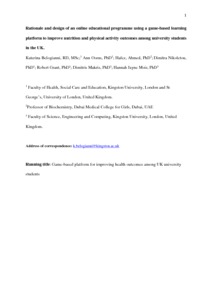Belogianni, K; Ooms, A; Ahmed, H; Nikoletou, D; Grant, R; Makris, D; Moir, HJ
(2019)
Rationale and Design of an Online Educational Program Using Game-Based Learning to Improve Nutrition and Physical Activity Outcomes Among University Students in the United Kingdom.
J Am Coll Nutr, 38 (1).
pp. 23-30.
ISSN 1541-1087
https://doi.org/10.1080/07315724.2018.1476929
SGUL Authors: Nikoletou, Dimitra
![[img]](https://openaccess.sgul.ac.uk/110155/1.hassmallThumbnailVersion/Belogianni-K-43380-AAM.pdf)  Preview |
|
PDF
Published Version
Available under License ["licenses_description_publisher" not defined].
Download (265kB)
| Preview
|
Abstract
OBJECTIVE: To assess the impact of an online game-based educational program on nutrition knowledge and dietary and physical activity habits among university students in the United Kingdom. DESIGN: Randomized controlled trial with pre- and postintervention comparisons. SETTING: Two higher education settings in London, UK. SUBJECTS: Current undergraduate and postgraduate students of two universities (n = 88) aged 18-34 years are randomly allocated to an intervention (n = 44) or a control group (n = 44). INTERVENTION: The intervention group will receive access to an educational website and online quizzes with gamification elements, including information about healthy eating and physical activity. The control group will receive no information. Duration of the intervention will be 10 weeks. MEASURES OF OUTCOME: Primary outcome is nutrition knowledge. Secondary outcomes include dietary and activity habits. Nutrition knowledge and dietary and activity habits will be assessed using questionnaires. Weekly steps will be counted using pedometers. Assessment of anthropometric and metabolic risk factors will take place. ANALYSIS: Quantitative analysis will investigate changes in nutrition knowledge between the two groups of the study population. Linear regression analysis will be used, if the data follow the normal distribution (otherwise binomial regression analysis), to examine whether field of study, residence status, body mass index (BMI), and demographic factors affect nutrition knowledge. Associations between changes in knowledge and dietary and physical activity behavior will be assessed by correlations. CONCLUSIONS/IMPLICATIONS: The study will provide insights with regard to the design and use of online game-playing as a cost-effective approach to improve nutritional knowledge among university students.
| Item Type: |
Article
|
| Additional Information: |
This is an Accepted Manuscript of an article published by Taylor & Francis in Journal of the American College of Nutrition on 02/08/18, available online: http://www.tandfonline.com/10.1080/07315724.2018.1476929 |
| Keywords: |
Health education, Internet, exercise, nutrition, university, Health education, Internet, nutrition, exercise, university, Health education, Internet, exercise, nutrition, university, 1111 Nutrition And Dietetics, Nutrition & Dietetics |
| SGUL Research Institute / Research Centre: |
Academic Structure > Infection and Immunity Research Institute (INII) |
| Journal or Publication Title: |
J Am Coll Nutr |
| ISSN: |
1541-1087 |
| Language: |
eng |
| Dates: |
| Date | Event |
|---|
| January 2019 | Published | | 2 August 2018 | Published Online | | 11 May 2018 | Accepted |
|
| Publisher License: |
Publisher's own licence |
| PubMed ID: |
30071183 |
| Web of Science ID: |
WOS:000457703800003 |
 |
Go to PubMed abstract |
| URI: |
https://openaccess.sgul.ac.uk/id/eprint/110155 |
| Publisher's version: |
https://doi.org/10.1080/07315724.2018.1476929 |
Statistics
Item downloaded times since 14 Nov 2019.
Actions (login required)
 |
Edit Item |



